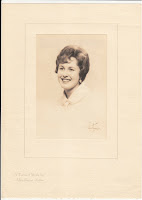I joined ancestry.com and started filling in little boxes of my lineage. You type in names, and then "hints" pop up with other people's family trees and public records such as census reports. I got absorbed, because there's always more to do, observe, and think about.
The census reports are exciting because they're fairly accurate (and there are ways to correct obvious errors). I found that both my grandmother Tillie and my grandfather Frank lived in Milwaukee with their parents in 1900. How did they meet? What were their mattresses like? I found Frank's WWI draft registration. His own handwriting reports that he is "short" and "stout" and is missing part of a digit. It was 1918, and he already had a wife and child (my mother). Did Frank go to war? I don't know! I will ask Frank's son, my mom's brother, when I see him in August.
My dad's side of the family goes back to the 1700s; they were early settlers in North Carolina and moved on to Tennessee. One ancestor got land grants as a reward for bringing in 8 new families to Tennessee. The settling men incorporated a town "because there wasn't any form of government there." They formed a 13-man commission to be the judges. Then one went out hunting and was "killed by an Indian while hunting with Boone."
I have found one Will by a grandfather named John Allred. In 1792 he left land to his sons and "negroes" and cows to some of his daughters. He left my great-something-grandmother Elizabeth Horner ten shillings. Who knew the young country was on the British currency by that time? And what was the value of 10 shillings? Probably she didn't get much because her husband William Horner was prosperous. Deed records show him buying hundreds of acres for miles around. Elizabeth and William's son "Capt. Jack" Horner looked westward farther, and started plans for a new town in Missouri, where his son and grandsons settled the town of Hornersville with land from the Louisiana Purchase.
Men were looking out and seeing land, land, bountiful land to be had for the settling. Exploring, pioneering, starting towns, was the happening thing.
And what were the women doing? They were having many many many babies, and contrary to popular belief many of those many babies lived to enormous ages. In checking some of my dates I could find great-grandmothers who started having babies at 17 and didn't stop until their late 40s. From time to time not surprisingly the wife would die and then another wife would be married and have lots more children.
If the earliest generations were settlers, by the time things got down to grandfathers, starting companies was the thing. One of Alan's great-grandfathers started a department store, and his dad's father started a bus company. My mother's father Frank (of the draft card) began his own shoe company, and my grandfather Robert had his own magazine, Mississippi Valley Contractor, that he edited and ran for 50 years. They started having smaller families.
That was easier on their wives, who were still putting laundry through a wringer and tending the chickens and cows that everybody had. They sewed their own clothes and put up jam. They took care of sick people at home. One of them, Fannie Dixon Waggener Schaefer, was also a professional musician. Sometimes I wander around here thinking these women would have no use for me!
Because what do I do today? I stand on their shoulders. I imagine our country's history through their experience. I write about them, and future generations will know them!



